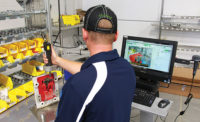Flexible, Connected ‘Smart Factories' Are Vital to Mixed-Model Auto Assembly

Photo courtesy ABB Robotics
ZURICH—Advanced manufacturing technology will play a key role as the automotive industry continues to transition to mixed-model assembly of internal combustion engine (ICE), hybrid and electric vehicles. According to a recent survey conducted by ABB Robotics, artificial intelligence, robotics and other state-of-the-art automation will help automakers and suppliers address a variety of production challenges.
“Automotive manufacturers are acutely aware that advanced robotics, AI and digital twin technology are positive drivers of change,” says Joerg Reger, managing director of ABB Robotics automotive business line. "Together, these technologies are forming the building blocks of smart factories, which will help automakers introduce new models more quickly and cost-effectively, while greatly reducing energy consumption and costs and meeting sustainability targets.”
The survey highlighted the importance of robotics and advanced automation with 64 percent of respondents agreeing there would be an increase in the use of autonomous mobile robots in automotive manufacturing, while 57 percent agreed that more collaborative robots will be introduced alongside workers to perform repetitive assembly tasks.
Respondents cited a major leap for the industry driven by generative AI and software, with 82 percent agreeing that leveraging this technology had the potential to reduce vehicle manufacturing costs, improve quality and streamline the introduction of new models. The adoption of another key technology, digital twins and simulation, is also expected to rise significantly, according to 73 percent of respondents.
The survey also underlined how the uptake of flexible manufacturing was viewed as a crucial way to navigate the complexities that automakers and suppliers face. These include unpredictable levels of demand for certain vehicle types including EVs, hybrids and ICE vehicles, with manufacturers needing to assemble different power trains on a single site, while maintaining faster product lifecycles. Over the next five years, 84 percent of those surveyed predict that flexible manufacturing will be a significant factor in vehicle assembly.
“Flexible manufacturing is essential when it comes to managing the very real complexities, as well as financial commitments, many carmakers currently need to tackle….” claims Reger.
“The ability to quickly add extra and different assembly capacity as a module—when customer demand for a particular model suddenly increases or a new power train is available—without disrupting production or requiring significant capital expenditure remains vitally important,” explains Reger.
While survey respondents supported the introduction of new technology and viewed the future smart factory positively, there was recognition of some of the challenges involved in reaching this destination. High initial costs (54 percent) were viewed as the biggest constraint, while technical challenges (35 percent), cybersecurity and data protection (32 percent) all featured prominently, as did workforce adaptation (32 percent) and the lack of skilled employees (28 percent).
Looking for a reprint of this article?
From high-res PDFs to custom plaques, order your copy today!






